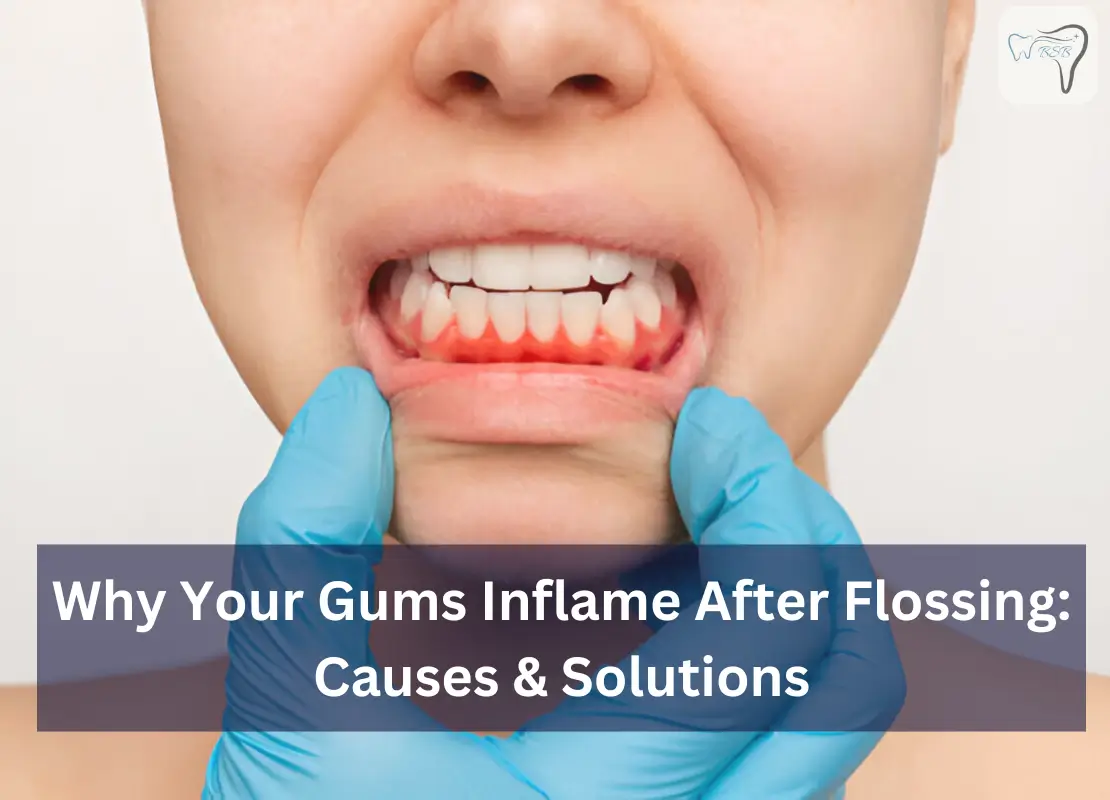Maintaining proper oral hygiene through flossing can sometimes lead to inflamed gums when plaque and food particles aren’t removed correctly. Improper flossing and aggressive brushing often cause irritation, pain, and swollen, sore gums, potentially leading to gum disease or gingivitis.
While hormonal changes, hormonal fluctuations, sensitivity, and allergic reactions to oral care products can cause swelling, using gentle techniques with waxed dental tape, hypoallergenic toothpaste, mouthwash, and salt water rinses helps maintain gum health. Regular professional cleanings, proper treatment of infections and illnesses with medication, plus essential vitamins can prevent gum inflammation.
Why Your Gums Inflame After Flossing: Causes & Solutions(Short Answer)
The Importance of Flossing for Oral Health
Despite playing a pivotal role in oral hygiene, flossing remains overlooked by many Americans. As a dental professional, I’ve observed that only a minority – roughly 16% of individuals – maintain proper daily oral care practices.
The American Dental Association (ADA) emphasizes that while toothbrushes clean surface areas, they can’t reach between teeth and along the gumline where plaque and food particles accumulate. Recent studies highlight this concerning gap in oral care maintenance, showing that consistent flossing significantly improves dental health outcomes.
What is Gum Inflammation and Why Does it Happen?
When bacteria and debris accumulate along the gumline and teeth, your body’s response triggers an immune response in the gum tissue. This leads to gum inflammation (gingivitis), causing redness, swelling, and tenderness of the gums. While flossing helps prevent infection, improper technique can cause irritation and exacerbate inflammation, particularly with underlying gum disease.
Common Causes of Inflamed Gums After Flossing
Swollen gums after flossing can result from several factors, such as incorrect flossing methods and the onset of gum disease. Understanding the causes of your gum discomfort and finding effective solutions will be our next focus.
Improper Flossing
Improper flossing techniques, such as using too much force or a saw-like motion, can cause gum irritation and swelling. Flossing aggressively can lead to damage to delicate gum tissue, making it more susceptible to inflammation.
It is important to use a gentle up-and-down motion with waxed floss or dental tape, as these materials are less likely to fray and cause harm. Ensuring that the floss is correctly placed between each tooth and gently slid along the gumline helps avoid further injury.
Gingivitis is a Common Culprit
Gingivitis, a mild form of gum disease, is often the main cause of swollen gums after flossing. This condition occurs when plaque builds up along the gumline, leading to inflammation, redness, and bleeding when flossing or brushing.
If left untreated, gingivitis can progress into more severe forms of gum disease, affecting overall oral health. Early detection and treatment, such as regular cleanings and improving oral hygiene, can prevent more serious complications.
Hormonal Fluctuations Impact on Gums
Hormonal changes can significantly impact gum health, making gums more sensitive and prone to swelling and inflammation. Changes during puberty, pregnancy, or menopause, as well as hormonal therapy, can increase blood flow to the gum tissues, resulting in tender and swollen gums.
The heightened sensitivity during these periods can cause gums to react more strongly to bacteria and plaque, leading to gum irritation after flossing.
Allergic Reactions from Oral Care Products
Certain ingredients in oral care products, such as toothpaste, mouthwash, or the floss itself, can trigger allergic reactions in some individuals. These reactions often manifest as swollen gums, tenderness, or inflammation following flossing.
Hypersensitivity to specific chemicals or fragrances in these products can cause discomfort and irritation. Switching to hypoallergenic or natural oral care products may help alleviate these symptoms.
Effective Home Remedies for Swollen Gums
If you experience swollen gums after flossing, there are several home remedies that can help reduce discomfort and inflammation. Saltwater rinses, using a mild solution of salt and warm water, can soothe irritated gums and reduce swelling.
Additionally, good oral hygiene practices such as gentle brushing with a soft-bristled toothbrush and using floss gently can improve gum health and prevent further inflammation. These remedies help reduce gum pain and promote faster healing of irritated tissues.
Salt Water Rinses for Gum Relief
Saltwater rinses are an effective and natural remedy for soothing swollen gums. The saline solution helps draw out infection, reduce bacterial growth, and provide a healing environment for the gums. To make a saltwater rinse, mix about half a teaspoon of salt with warm water and swish it around your mouth for 30 seconds.
This simple remedy can be used multiple times a day to help alleviate gum discomfort and inflammation, and is especially beneficial after flossing to promote gum relief.
Gum Disease and Flossing Aftermath
Flossing can aggravate symptoms of gum disease such as gingivitis or periodontitis, especially when gums are already inflamed or infected. In the early stages of gum disease, the gums may be more prone to bleeding and sensitivity.
As plaque and tartar build up along the gumline, flossing may further irritate the tissues, causing more pain and swelling. Addressing gum disease early through professional cleanings and consistent oral hygiene can help avoid further complications.
Brushing and Flossing Habits
Having treated thousands of patients with dentures, I’ve learned that while it’s not realistic or conceivable to completely avoid or eliminate plaque formation fast, we can take effective steps to control it.
The truth is, we’re dealing with a biological film of naturally occurring bacteria in your mouth that’s continually growing. While you can’t stop it entirely, proper maintenance can help prevent hardened tartar from developing.
How to Prevent Inflamed Gums While Flossing
- Practice Gentle Technique:Use a gentle back-and-forth motion when flossing to avoid harming your gums.
- Floss Daily:Floss every day to remove plaque and debris, reducing gum inflammation.
- Choose the Right Floss:Pick the right floss for your needs, like waxed, unwaxed, or for sensitive gums.
- Maintain Regular Dental Check-ups:See your dentist for routine check-ups to monitor gum health and prevent issues.
- Consider Alternative Cleaning Methods:Use interdental brushes or a water flosser if you have sensitive gums.
- Brush Twice a Day:Brush with a soft-bristled toothbrush twice daily to avoid gum irritation.
- Use Fluoride Toothpaste:Fluoride toothpaste helps prevent plaque buildup and gum inflammation.
- Eat a Balanced Diet and Avoid Sugary Snacks:Eat a healthy diet and avoid sugary snacks to prevent gum irritation.
Treatment Options for Inflamed Gums
Treating gum issues requires addressing the underlying causes through professional dental cleaning to remove plaque and bacteria. For ongoing care, prescription medications, antimicrobial mouth rinses, and lifestyle modifications are essential in removing and reducing inflammation.
How To Get Rid of Inflamed Gums?
Managing inflamed gums begins with proper oral hygiene – regularly brush and floss to remove plaque and bacteria from your teeth and gum tissues. Use a soft-bristled toothbrush with gentle strokes for best results. For immediate relief from severe pain, try over-the-counter medications like ibuprofen or aspirin.
If gum swelling persists or you have gum disease, consult a dentist or specialist, especially if you’re pregnant or have other oral health concerns. They may prescribe antibiotics or other medications for treatment.If tooth damage occurs, you might need cavity fillings vs root canal depending on the severity.
Gum Swelling Can Lead to Periodontal Disease
Gum swelling is a serious condition that shouldn’t be ignored. When sore gums and swollen gums are left untreated, they can progress to gum disease and eventual tooth loss. Prevention starts with proper care: brush twice daily and floss using a soft-bristled toothbrush, followed by a thorough rinse.
Schedule regular checkups and cleanings with your dentist for early treatment. Beyond hygiene, maintain oral health by following a balanced diet, avoiding sugary snacks, and steering clear of smoking and tobacco products. As a dentist with 15 years of experience, I’ve seen how regularly addressing the cause of gum issues can prevent severe complications.
Maintaining Proper Nutrition for Gum Health
Malnutrition and vitamin deficiencies can significantly impact your oral health, potentially leading to swollen gums, soreness, and bleeding. Essential nutrients like vitamins A, C, B2, B3, B6, and B12 play crucial roles in preventing gingivitis and bacterial infection. A balanced nutrition treatment plan serves as a preventative measure against both gum issues and systemic diseases, including heart disease.
I recommend incorporating fruits like oranges, strawberries, kiwis, and vegetables such as bell peppers and dark leafy greens. Additionally, dairy products, eggs, lean meats, nuts, and seeds support wound healing in gum tissue.If you experience significant bleeding, use gauze to apply gentle pressure and help stop the flow until you seek medical attention.
When to See a Dentist for Inflamed Gums
If you notice ongoing or severe gum inflammation despite maintaining proper oral hygiene practices, it’s crucial to consult your dentist. Also, seek timely dental care if you observe signs of gum disease, like bleeding gums, persistent bad breath, or noticeable changes in gum appearance.
Conclusion
In conclusion, inflamed gums after flossing are often caused by improper techniques, gum disease, or hormonal changes. Using gentle flossing methods, proper dental products, and addressing underlying conditions can prevent irritation and inflammation. Regular check-ups and consistent oral hygiene practices are key to maintaining healthy gums.
Ferquently Asked Questions(FAQ’s)
Why are my gums so inflamed after flossing?
Aggressive flossing can irritate gum tissue, leading to swelling and inflammation. If you push the floss too hard, it may cut into sensitive areas, causing irritation. To prevent this, floss gently once a day, ensuring it reaches the gum line without forcing it deep into the gums.
What causes inflamed gums?
Plaque and tartar buildup can irritate the gingiva, leading to swelling and bleeding. This condition, known as gingivitis, may progress to periodontitis, causing tooth decay and even tooth loss if left untreated. Regular oral hygiene helps prevent these issues.
Why are my gums worse after flossing?
Flossing too hard or too often can cause gum irritation, leading to swelling and soreness. If this happens, try gentler flossing or reduce frequency. However, persistent gum pain may indicate gingivitis or an underlying oral health issue.

